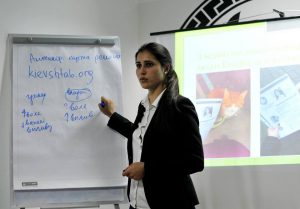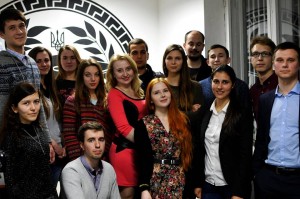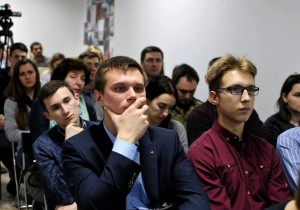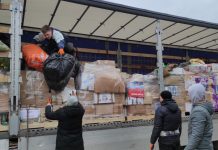Halyna Yanchenko ’04
Project Location: Kyiv, Ukraine
$2,200 in Eastern Europe FLEX-Ability Grant Funding
 From February 3 – March 30, Halyna Yanchenko ’04 implemented a project aimed at promoting the Anti-Corruption Repair Map of Kyiv as an instrument of curbing corruption in public finances. The map is an interactive and informative tool available online at www.kievshtab.org, which displays all buildings, including schools, hospitals, residential buildings and playgrounds that should have been repaired with city funds over the last two years (2015-2016). By clicking on a specific building on the map, one can view all information related to this building, such as title of the building, exact address and, most importantly, repair work details (the amount allocated for the repairs, the repair company, and the deadline for completion).
From February 3 – March 30, Halyna Yanchenko ’04 implemented a project aimed at promoting the Anti-Corruption Repair Map of Kyiv as an instrument of curbing corruption in public finances. The map is an interactive and informative tool available online at www.kievshtab.org, which displays all buildings, including schools, hospitals, residential buildings and playgrounds that should have been repaired with city funds over the last two years (2015-2016). By clicking on a specific building on the map, one can view all information related to this building, such as title of the building, exact address and, most importantly, repair work details (the amount allocated for the repairs, the repair company, and the deadline for completion).
Using project funding, Halyna and her team of FLEX alumni and other volunteers implemented a wide range of activities. They designed, printed, and disseminated announcements on residential building with repairs planned within the city budget, held several presentations and meetings with volunteers and active citizens, developed two analytics related to the public funds allocated for repairs, and created a website that would serve as a platform for ongoing dialogue and investigation. Among volunteers were FLEX-Ability Workshop participants Kyrylo Shturbabin ’14 and Yelyzaveta Petrova ‘13.
 Halyna and her team also conducted anti-corruption educational activities involving over 150 individuals. The trainings included session on how to identify and combat corruption in city or state funded repairs, lectures introducing citizens to the map and its functions, and a panel discussion hosted by the EU Delegation to Ukraine titled “How to fight corruption in Ukrainian society? The position of youth.”
Halyna and her team also conducted anti-corruption educational activities involving over 150 individuals. The trainings included session on how to identify and combat corruption in city or state funded repairs, lectures introducing citizens to the map and its functions, and a panel discussion hosted by the EU Delegation to Ukraine titled “How to fight corruption in Ukrainian society? The position of youth.”
Thanks to the prepared announcements, citizens of Kyiv have received detailed information on 1,788 buildings, for which funds were allocated in 2014-2015. These announcements contained information on how citizens could report any perceived corruption during the process and join anti-corruption activities.
The team gathered and processed 110 citizen claims regarding buildings where, despite allocated funds, repairs had been completed poorly, completed for inflated prices, or had not been completed at all. These claims will help to identify the cases where crimes may have occurred.
 Over the course of the project, organizes conducted an analysis of the contracts winners. Having analyzed all the repair contracts signed in 2014 and 2015, an analytic expert identified the top 25 winners for each year and did thorough background research on each company and its owners. According to the analysis, out of the top 25 companies at least six were previously involved in corruption or embezzlement of public funds, while another four had suspicious financial histories. The team plans to publish an article about their findings in the most popular internet portal of Ukraine, the Ukrainska Pravda.
Over the course of the project, organizes conducted an analysis of the contracts winners. Having analyzed all the repair contracts signed in 2014 and 2015, an analytic expert identified the top 25 winners for each year and did thorough background research on each company and its owners. According to the analysis, out of the top 25 companies at least six were previously involved in corruption or embezzlement of public funds, while another four had suspicious financial histories. The team plans to publish an article about their findings in the most popular internet portal of Ukraine, the Ukrainska Pravda.
In the final phase of the project, the team developed a website that will allow activists and stakeholders to quickly access information on repairs, detect ongoing violations, and inform the project team. Besides information related to the mapping project, the site will also provide instructions and investigation updates.






